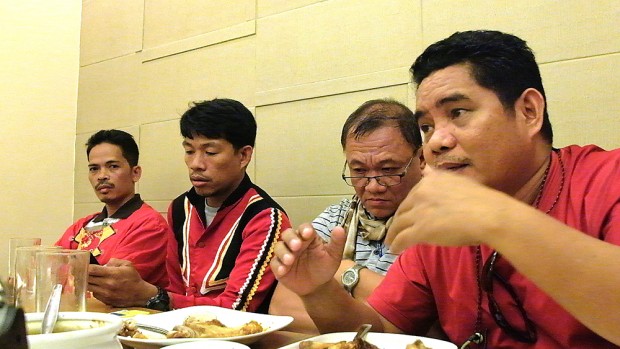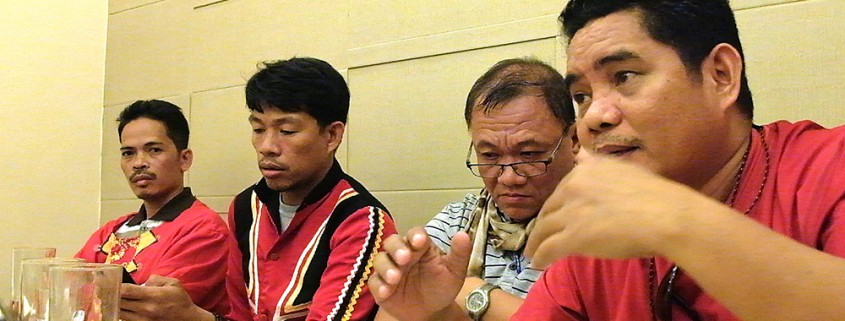UPDATE: ‘Fake’ datus leaders of US-backed paramilitary groups

(From left) Belandres, Maca, Tariman and Apas at the Sept. 15 briefing with journalists and bloggers in a Makati City restaurant.
The three datus the Armed Forces of the Philippines and the Office of the President presented before the media and bloggers, Sept. 13 and 15 are not genuine tribal chieftains but are in fact members of paramilitary groups responsible for atrocities across Mindanao.
Human rights group Karapatan (Alliance for the Advancement of People’s Rights) revealed in a statement crimes allegedly committed by Nestor Apas, Rico Maca and Marcial Belandres.
Apas is a known leader of the paramilitary Alamara in Davao del Norte responsible for harassing students and teachers of the Mindanao Interfaith Services Foundation, a Lumad school in Kapalong, Davao del Norte, Karapatan said.
He was seen last February 6 in the company of soldiers of the 60th Infantry Battalion-Philippine Army (IBPA) that encamped at the school. He was also present when the Alamara and Cotabato representative Nancy Catamco raided the compound last July 23.
Apas allegedly instigated and facilitated the filing of serious illegal detention and kidnapping charges against leaders and supporters of the 700 Manobo evacuees sheltered at the Haran compound of the United Church of Christ in the Philippines in Davao City. The Davao City Prosecutors Office dismissed these charges for lack of evidence.
Maca is allegedly connected to the paramilitary group led by a Hasmin Acevedo operating in barangays Umalag, Saigao, Caromata in San Miguel town, Surigao del Sur. He frequently joins patrol missions of the 36th IBPA that harasses Lumad communities in San Miguel.
According to Karapatan-Caraga, Maca has no hereditary claims and is only made a datu by the National Commission on Indigenous Peoples. Maca allegedly uses his designation to demand a Certificate of Ancestral Doman Title to operate a small-scale gold mine in Umalag.
Belandres for his part was identified by witnesses as one the killers of Lumad leader Henry Alameda in Sitio Cabalawan, San Isidro, Lianga, Surigao del Sur last October 24.
Karapatan disclosed that Apas, Maca and Belandres are not only active paramilitary criminals but are also fake datus who were either self-proclaimed or NCIP-declared and have since turned their backs on their people.
The three, along with their respective paramilitary groups and handlers, are supported and directed by the Office of the President and the US Armed Forces, as revealed at a dinner briefing with a select group of journalists and social media personalities and by a July-September 2012 magazine article published at Fort Bragg, North Carolina.
‘Fake’ datus
In a briefing with journalists and bloggers in a Bel-Air, Makati restaurant last Sept. 15, the three introduced themselves as chieftains. The event followed a press conference organized by the Armed Forces of the Philippines at Camp Aguinaldo two days earlier.
Belandres said he is the leader of 6,000 Manobo in the towns of Barobo and Lianga, Surigao del Sur while Maca said he leads 14,000 Manobo in San Miguel. Apas did not divulge a territory and a number but said he is a tribal council member of Talaingod, Davao del Norte and a traditional law expert.
In an interview with the radio program Tala-Akayan over Radyo Veritas last Sept. 17, however, two Roman Catholic nuns who have worked with the Lumad for decades said a genuine datu is always with his people.
Sr. Rowena Pineda, MMS (Medical Mission Sisters) and Sr Mary Jane Caspillo, MMS both said that a datu must be acclaimed as such by his tribe primarily for his ability to settle disputes and unite his people.
The MMS first initiated medical interventions in Tawi-Tawi province but has since transferred their health programs to Lumad communities in Mindanao island itself since the 1990s.
“Our many years of working with the Lumad make us understand that anyone who takes up arms, harms and divides his own people is not a genuine datu nor is recognized as one,” Pineda said.
The medical missionaries also said that the Lumad observe a strict process in choosing succeeding datus.
“In case a Datu dies, his widow becomes the first choice to succeed him as Bai (woman tribal leader) if she is also capable of uniting the tribe,” Caspillo said.
Both nuns expressed doubts that Belandres, a nephew of the September 1 Lianga Massacre victim Datu Juvello “Bello” Sinzo, is a genuine datu under these traditions.
“The tribe must undergo a strict selection process first before they can acclaim someone as their new datu and only after Sinzo’s widow is judged incapable of being a bai,” the nuns said.
Sinzo, along with fellow massacre victim and nephew Dionel Campos were buried in two separate cemeteries in Lianga last September 13, while third victim Emerito Samarca was buried in Butuan City a day earlier. No succession proceedings have yet been initiated as more than 2,000 of his tribes-people have evacuated to Tandag City after their murders.
Karapatan-Caraga secretary general Eliza Pangilinan said that Belandres had neither territory nor a constituency he leads that qualifies him to be a datu.
“Marcial was introduced by the military as Datu Sibugan, which is not true as he does not have a territory and constituency,” Pangilinan said.
Instead, Belandres had been a Magahat leader with close family ties to Calpit Egua, leader of another paramilitary group based in Prosperidad, Agusan del Sur, Karapatan said.
An Inquirer report also reported that tribal leaders in Talaingod have repudiated Apas’s claim to datu-hood. (Read Inquirer report here)
The report said that Apas has turned his back on his people when he joined the paramilitary group Alamara.
It quoted a Datu Doloman Dawsay saying that Apas “…does not have influence over the constituency, especially that he is not staying with the tribe in the hinterlands.”
“You cannot be a datu and stay in the lowlands,” Dawsay said.
AFP, Palace and US-backed
Karapatan said that the press conference held at Camp Aguinaldo last September 13 is proof that the AFP is linked to the paramilitary groups.
At the September 15 briefing, Apas at first denied they are being supported by the military and even complained of difficulties in connecting to high police, military and government officials.
Upon further questioning, the group admitted the briefing was organized by the Whole of Nation Initiative under the Office of the President, which also paid for the dinner served at the event.
A certain Tammy Bejar interjected by saying her office was only trying to reach out to the group of Apas, Belandres and Maca, which also included a young Manobo named Asinad Bago of Talaingod and National Alliance for Democracy leader Arthur Tariman.
Tariman appeared to be the group’s leader who attempted many times to restate the others’ statements and to stifle questions from the journalists and bloggers present.

Political satirist and book author Mae Paner reacts as press briefing organiser Tammy Bejar reveals she works for the Whole of Nation Initiative under the Office of the President.
The whole-of-nation concept, a US Army magazine said, is the approach adopted for the AFP’s Internal and Security Plan, otherwise known as Oplan Bayanihan with the“advice and assistance of the Joint Special Operations Task Force (of the US Armed Forces)”. (See source here)
“Although authored by the Armed Forces of the Philippines, the plan encompasses a whole-of-nation approach, with a focus on coordinating all efforts under the broad direction of a national internal-security strategy,” the article, written by a Col. Fran Beaudette of the Special Warfare Magazine published in Fort Bragg, North Carolina, explained.
Launched in 2011 by the Benigno Aquino administration, Oplan Bayanihan is a “re-imagining” of the government’s counter-insurgency and counter-terrorism program which “highlights the need to further engage more stakeholders, national government agencies and local government agencies, civil society organizations and community based groups.”
Bejar said she was in office just two weeks prior and the event was her first activity under the Whole of Nation Initiative.
“I sought permission to do this, that’s why I invited you,” Bejar said, referring to the journalists and bloggers present.
Apas’ group also received additional media mileage from two successive opinion essays by Philippine Daily Inquirer’s Solita Monsod described by Karapatan as a “self-confessed member of Oplan Bayanihan’s multi-sectoral advisory group.”
Arrested, shot and killed
In statements and interviews, the Roman Catholic Diocese of Tandag and Surigao del Sur governor Johnny Pimentel said that Belandres is a leader of the AFP-created paramilitary.
“They are members of the Magahat/Bagani, a paramilitary group headed by Datu Calpito Egua, Marcos Bocales, Marcial Belandres and Bobby Tejero,” the diocese said in a statement published by the Catholic Bishops Conference of the Philippines in its website.
“I have no doubt in my mind that that these paramilitary groups were created, armed, trained and controlled by the AFP for its counter-insurgency program,” Pimentel said.
“The problem is, they have created a monster they could no longer control. They must be arrested, shot and killed if need be,” he said. #
(Text and photos by Raymund B. Villanueva)

